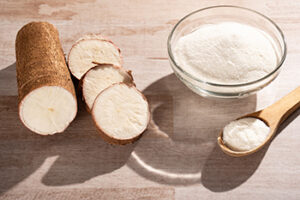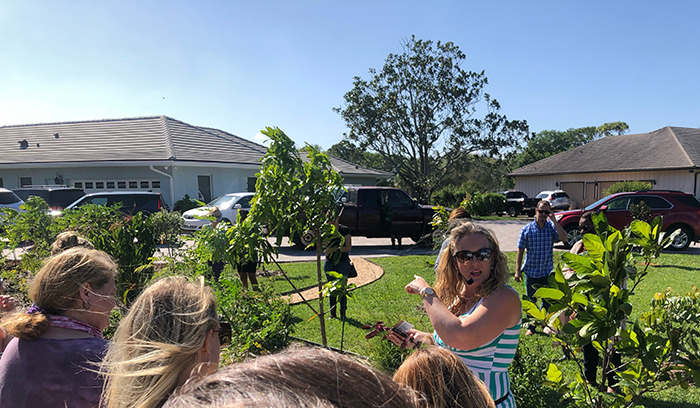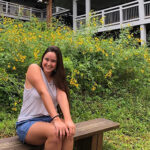Jennifer Reelitz has always loved growing things, but her passion for producing vegetation has morphed into creating a self sufficient environment for her family, and she is passionate about passing her experience on to others. It’s called Food Forestry, and it’s a growing trend.
In addition to her knowledge of End Times and the restrictions that will be placed on buying and selling, Jennifer is also motivated by the uncertain times we live in now. “Right now there are six countries in the world that are experiencing hyper-inflation. In Venezuela, right now, a month’s salary will buy you a hotdog. So it’s wise to not be dependent on a system that could have vulnerabilities.”
Additionally, Jennifer believes that growing food is part of being good stewards of God’s creation. “We are so distracted in today’s world that we don’t take time to plant and grow what God has provided for food for us. And getting your hands dirty connects us to Creation,” Jennifer said.
You literally take a stick of Yucca. You put it in the ground. You come back a year later, and you’ll have 20 or 30 pounds of potatoes.
Even in her earliest days of apartment living, Jennifer has always loved planting things. If she had a potato that started growing eyes, she would go out and bury it in a pot of dirt. Over time her passion grew and her garden continued to get bigger.
Her little garden on her quarter acre land in West Palm has grown into a flourishing Food Forest at her property in Jupiter Farms. She believes that she is called to prepare for end times when believers will not be able to buy or sell without the mark of the beast. “I do think that we are much closer to the end times than we ever have been, and I want to be able to provide for my family whether or not grocery stores have food and the currency is stable. It’s very simple too. Growing tropical potatoes is as easy as throwing a stick in the ground.
“This is not hard or expensive,” Jen said. “A lot of people make the mistake of trying to grow vegetables that don’t grow well in South Florida. Know your zone.”

If you’ve ever eaten at a Cuban restaurant, you may have had Yucca fries. Yucca is also called Cassava which grows easily here. Jennifer explained how to grow Yucca, “You literally take a stick of Yucca. You put it in the ground. You come back a year later, and you’ll have 20 or 30 pounds of potatoes.”
Take a quick trip into a neighborhood Latin grocery store, and you will see White Malanga. Jennifer explained, “If you buy one of those potatoes and put it in the ground, a year later you will see a big, beautiful orphan ear plant, and the entire plant is edible–the leaves, the stem, and the one potato in the ground will have turned into five or six!”
The Malanga is very creamy and tastes like a dumpling. They have twice the caloric value of white potatoes and are much richer and more flavorful than white potatoes.
Jennifer gives Food Forest tours and helps people get started growing their own Food Forests. She also gives food cuttings that she calls Friendship Gardening. She encourages that friendships are a great way to learn gardening. “Find people. Start hanging out and swap cuttings and seeds and share ideas. Look for people that are a little further on the path than you are who have different interests and learn from one another.”
Jennifer has collaborated with author Amanda Alders Pike, who published the book, Florida Food Forests, A Comprehensive Guide, and they shared information about the various plants that each of them grow.
Any small plot of land is sufficient to start a Food Forest. Cassava and Papaya need very little space and provide a great amount of food. Container gardening is also an option. Even zero lot line yards, where lighting is limited can produce a great deal of food. Just choose plants that grow well in partial shade. Jennifer advised, “Plants such as Katuk grow well in partial shade, and the leaf is 49% protein, 18% potassium. Longevity spinach also grows well in the partial shade. Coffee, kale, miracle fruit, monstera deliciosa and many other plants grow well in partial shade.”
“There is no downside to growing your own Food Forest. There are no failures, only lessons, and lessons always make you smarter.” ~Jennifer Reelitz
In her tours, Jennifer speaks of perfectionism and emphasizes the importance of letting go of trying to create a perfect garden. “Every plant does not have to grow perfectly, or be planted in the perfect spot with the perfect soil and perfect sun exposure,” Jennifer said. “When you plant one tomato plant, or one arugula plant, it’s very easy to obsess over whether these plants are doing well.”

When the plant isn’t doing well, she pulls it up and plants it again. She doesn’t have time to research. She prefers to just keep planting and watering and cutting them back and let them grow as they will.
When Jennifer gives her tours, she comes across as a novice. When asked about this, she responded, “I hate the term Master Gardener or Master Class because none of us have mastered this. We’re all still figuring this out and learning.” Jennifer doesn’t even usually test the soil. On soil testing, Jennifer quoted her friend Amanda Alders Pike, “You could stand on one spot, test the soil, walk two feet away, test the soil there and get a totally different reading.”
If you want to start a Food Forest, now is a great time. It’s Spring, and the weather is temperate, not too hot or too dry. The rainy season is upon us and this is when plants will get established. If you don’t think you’ll monitor the irrigation, then mulch the plants liberally. Jennifer advised that fruit trees which come from a nursery are generally used to being watered every day, so water those plants at least every other day initially. Then during the winter, when it’s dry and hasn’t rained in a few weeks, water them once a month.
Food Forests are not expensive to start. Trees and More in Palm City sells banana plants for about $5 per plant. You can buy a yucca stick for $2. Malanga are usually about 50¢.
Five plants that Jennifer suggests to start your food forest are:
- Katuk
- Cassava
- Banana
- Papaya, and
- Malanga.
If you keep them in pots, make sure you mulch them, but plant them in the ground whenever possible. Jennifer explained that potted plants need more frequent watering, but plants that are in the ground do not need as much attention. And once they are established trees, they have access to ground water.

Gabriela Obando, an avid Edible Gardener and Ecology major at University of Florida, also suggests growing broccoli and zucchini for its low investment and ease of growth. “Another growing movement is bringing Edible Gardens to youth centers and schools so students can learn to grow these on their own and bring home a way for their families to support themselves.” Many organizations, such as the Boys and Girls Club are partnering with edible plant programs such as Strong Roots, in areas where they know families are experiencing food disparities.
“There is no downside to growing your own Food Forest. There are no failures, only lessons, and lessons always make you smarter,” says Jennifer Reelitz.
If you would like to see Jennifer’s Food Forest in Jupiter Farms, you can email her at [email protected] and request a free tour.



